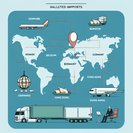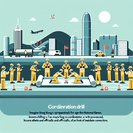
Hong Kong’s Immigration Department (ImmD) confirmed on 24 October that it has flown 90 unsubstantiated non-refoulement claimants back to their home countries after a four-day enforcement sweep that began on 20 October. The group—46 men and 44 women, some of whom had completed prison sentences—were escorted from detention facilities to Hong Kong International Airport and placed on commercial flights out of the city. Officials said the removals were arranged in close co-ordination with airlines and foreign consulates to ensure the process ran smoothly.
The scale of this week’s operation underscores how aggressively Hong Kong is now enforcing its updated removal policy, which since 7 December 2022 allows officers to deport a claimant once any judicial review has been dismissed by the High Court. The city’s Unified Screening Mechanism, introduced in 2014 to process refugee, torture-claim and persecution cases, has faced criticism for lengthy backlogs and high rejection rates; more than 13,000 claims have been filed since inception, but fewer than 1% have been substantiated. Officials argue that swift removal of rejected applicants is essential to deter abuse of the system and free up resources for genuine protection cases.
For employers, the crackdown means stricter compliance checks when hiring foreign workers—particularly in construction, catering and cleaning, sectors where overstayers often seek cash-in-hand work. Multinationals running regional mobility programmes out of Hong Kong should review onboarding processes to ensure that dependent partners or adult children of transferred staff are on the correct visa type and that travel documents remain valid throughout the assignment. ImmD officers have indicated they will step up spot inspections at worksites and residential addresses in the months ahead.
The operation also signals deeper co-operation between Hong Kong and source countries in South Asia and Africa: officials said repatriations were executed "through all appropriate measures," including dedicated charter segments where commercial capacity was limited. Diplomats from several consulates told Global Mobility Watch that they had been given 72-hours’ notice to issue one-off travel documents for deportees.
Looking forward, practitioners expect removals to accelerate. Legal advisers note that once outstanding judicial reviews are cleared, hundreds of additional claimants could be subject to removal within weeks. Companies relying on entry-level foreign labour should therefore monitor policy statements and build contingencies into workforce plans.
The scale of this week’s operation underscores how aggressively Hong Kong is now enforcing its updated removal policy, which since 7 December 2022 allows officers to deport a claimant once any judicial review has been dismissed by the High Court. The city’s Unified Screening Mechanism, introduced in 2014 to process refugee, torture-claim and persecution cases, has faced criticism for lengthy backlogs and high rejection rates; more than 13,000 claims have been filed since inception, but fewer than 1% have been substantiated. Officials argue that swift removal of rejected applicants is essential to deter abuse of the system and free up resources for genuine protection cases.
For employers, the crackdown means stricter compliance checks when hiring foreign workers—particularly in construction, catering and cleaning, sectors where overstayers often seek cash-in-hand work. Multinationals running regional mobility programmes out of Hong Kong should review onboarding processes to ensure that dependent partners or adult children of transferred staff are on the correct visa type and that travel documents remain valid throughout the assignment. ImmD officers have indicated they will step up spot inspections at worksites and residential addresses in the months ahead.
The operation also signals deeper co-operation between Hong Kong and source countries in South Asia and Africa: officials said repatriations were executed "through all appropriate measures," including dedicated charter segments where commercial capacity was limited. Diplomats from several consulates told Global Mobility Watch that they had been given 72-hours’ notice to issue one-off travel documents for deportees.
Looking forward, practitioners expect removals to accelerate. Legal advisers note that once outstanding judicial reviews are cleared, hundreds of additional claimants could be subject to removal within weeks. Companies relying on entry-level foreign labour should therefore monitor policy statements and build contingencies into workforce plans.








